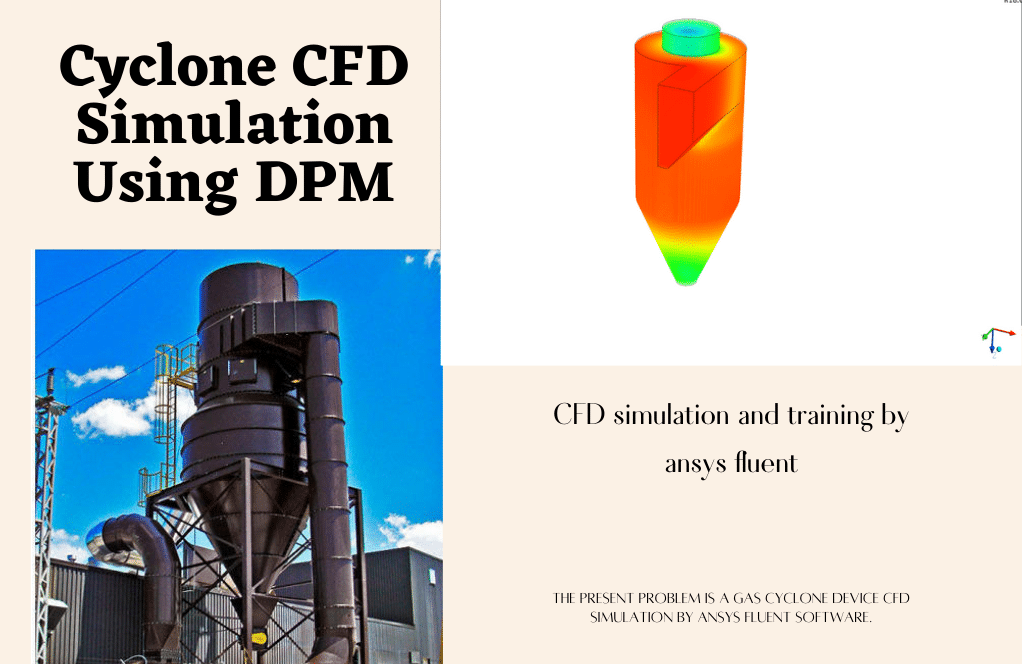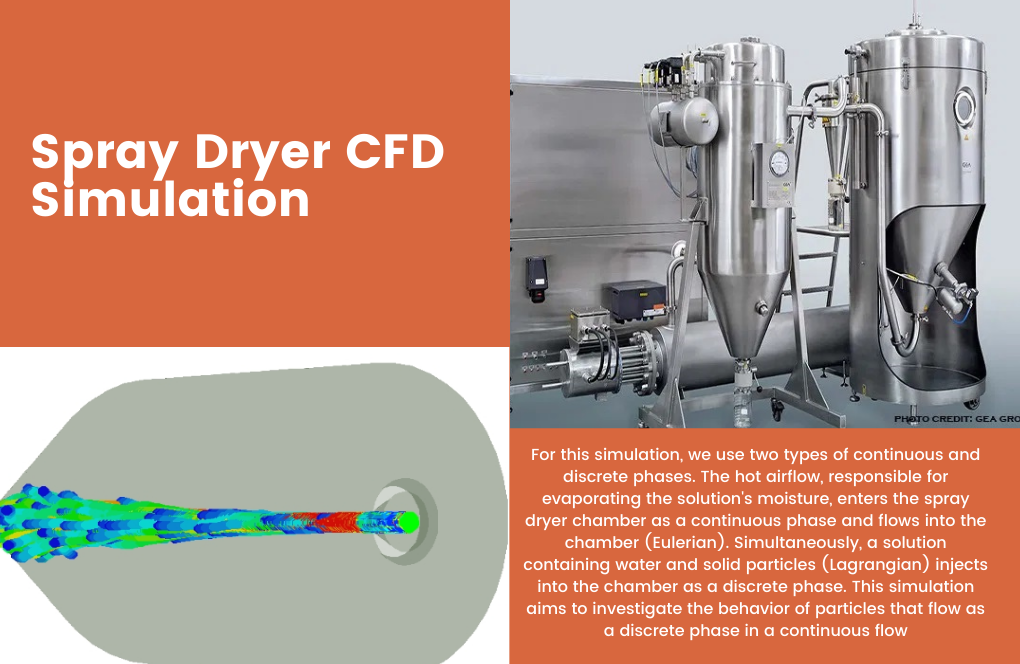Fluid Flow Around a Wavy Tape in a Tube CFD Simulation
Free
The present study investigates the fluid flow passing through a circular cross-section tube with a wavy tape inside it.
Click on Add To Cart and obtain the Geometry file, Mesh file, and a Comprehensive ANSYS Fluent Training Video.To Order Your Project or benefit from a CFD consultation, contact our experts via email (info@mr-cfd.com), online support tab, or WhatsApp at +44 7443 197273.
There are some Free Products to check our service quality.
If you want the training video in another language instead of English, ask it via info@mr-cfd.com after you buy the product.
Description
Fluid Flow Around a Wavy Tape in a Tube, ANSYS Fluent CFD Simulation Training
The present study investigates the fluid flow passing through a circular cross-section tube, using a wavy tape as a barrier by ANSYS Fluent software. This waveform acts as a thermal insulator. The purpose of the present study is to investigate the heat transfer in a tube.
Assumptions for fluid flow around wavy tape CFD simulation
To simulate the present problem, several assumptions are considered:
The simulation is Steady-State and the solver is Pressure-Based. Also, the gravity effect is ignored
Geometry & Mesh
The present 3-D model was designed by Design Modeler software. The geometry of the model is a circular cross-section tube having barriers in the form of a wavy bar. Due to the symmetry of the model, the desired geometry is designed as a semi-cylinder. The unstructured mesh was done using ANSYS Meshing software. The element number is equal to 653307.
CFD Simulation Procedure
Here is a summary of the steps to define and solve the problem in the table:
| Models | ||||
| Laminar | Viscous model | |||
| on | energy | |||
| Boundary conditions for fluid flow around wavy tape CFD simulation | ||||
| velocity-inlet | Inlet | |||
| 0.0110334 m.s-1 | velocity magnitude | |||
| 293.15 K | temperature | |||
| pressure-outlet | Outlet | |||
| 0 Pa | gauge pressure | |||
| wall | Walls type | |||
| 0 W.m-2 | heat flux | wave wall | ||
| 360 K | temperature | outer wall | ||
| Solution Methods | ||||
| Simple | Pressure-velocity coupling | |||
| second order upwind | pressure | Spatial discretization | ||
| second order upwind | momentum | |||
| second order upwind | energy | |||
| Initialization for fluid flow around wavy tape simulation | ||||
| Standard | Initialization method | |||
| -0.0110334 m.s-1 | z-velocity | |||
| 293.15 K | temperature | |||
CFD Results
After the solution process, the 3D and 2D contours of pressure, temperature, velocity, 2D and 3D flow lines and 2D and 3D velocity vectors are obtained.
1 review for Fluid Flow Around a Wavy Tape in a Tube CFD Simulation
Related products
-
Cyclone by DPM ANSYS Fluent CFD Simulation Training
Rated 5.00 out of 5$120.00$60.00 Student Discount










Chauncey Reichert –
What are the boundary conditions set for this simulation?
MR CFD Support –
The boundary conditions include the velocity inlet and pressure outlet. These are set based on the specifics of the tube design and the operating conditions.
Dr. Colin Pollich –
What are the main factors affecting the heat transfer performance of a tube with a wavy tape?
MR CFD Support –
The main factors include the design of the tape (e.g., wave amplitude and frequency), the properties of the fluid (e.g., flow rate, temperature, and thermal properties), and the operating conditions.
Prof. Maye Huel DDS –
Great results! I was impressed by the details in the 3D and 2D contours. Can you share more about how the presence of the wavy tape influenced heat transfer in the tube?
MR CFD Support –
We’re glad you liked the simulation results! The wavy tape creates turbulence within the flow, which enhances mixing and consequently increases the heat transfer rate within the tube. The surface texture of the wavy tape increases the surface area for heat exchange, contributing to a more efficient transfer of heat from the tape to the fluid or vice versa.
Aisha Anderson IV –
How does the wavy tape enhance heat transfer in the tube?
MR CFD Support –
The wavy tape disrupts the flow, creating turbulence and increasing the convective heat transfer. It also increases the contact surface area between the fluid and the tube, which further enhances heat transfer.
Margaret –
Even though the inlet velocity magnitude of water is low ( 0.0110334 m/s), doesn’t the wavy tape inside the pipe cause turbulent flow?
Celine Schulist –
Does this simulation also take into account any radiative heat transfer or is it purely conductive and convective heat transfer that’s observed?
MR CFD Support –
In this provided case of simulation, heat transfer is handled purely through conductive and convective means. The Radiative heat transfer effect has not been included in the set of assumptions for this particular study.
Dr. Lafayette Kuhn –
I have a keen interest in a simulation that involves an alternate tape design. Is it possible for you to facilitate this?
MR CFD Support –
Sure! We can help with simulations involving different tape designs. Please provide more details about your requirements, and we’ll do our best to accommodate your request.
Jenifer Ruecker –
The training material for simulating fluid flow around a wavy tape in a tube was comprehensive and well-structured. I particularly appreciated the detailed step-by-step approach to setting up and solving the simulation in ANSYS Fluent. The insights into the thermal insulation effectiveness of the wavy tape were quite intriguing.
MR CFD Support –
Thank you for your positive feedback on our training material. We are delighted to know that you found the instructions comprehensive and that the simulation provided valuable insights into thermal insulation. Your satisfaction is our top priority, and we look forward to supporting you in more CFD learning adventures!
Gaetano Mante I –
Splendid work on this CFD simulation! The wavy tape as a thermal insulator in a circular tube seems like a clever idea. The visual results demonstrating pressure and temperature variations suggest a profound understanding of fluid dynamics. The thorough approach from assumptions to solving with ANSYS Fluent shows significant expertise. Great job on the utilization of the Laminar model and the detailed boundary conditions application. It’s always exciting to see theory applied effectively in simulations like this.
MR CFD Support –
We greatly appreciate your kind words and are glad to know that you find the simulation insightful. At MR CFD, we strive to provide simulations that are not only technically sound but also clear to understand and apply. Thank you for recognizing the effort and expertise that goes into each project. Should you have more questions or need further assistance, we’re always here to help!
Sid Fay –
This training product seems very comprehensive. Are there any visual materials or tutorials included to help understand the simulation process better?
MR CFD Support –
Yes, we have a full suite of visual materials that accompany this training product, including step-by-step tutorial videos, graphical illustrations of the setup, and detailed screenshots to guide you through the simulation process and help you understand the CFD analysis comprehensively.
Demarcus Abbott PhD –
Really impressed with the level of detail in the simulation outcomes! The complete picture of the fluid dynamics you’ve described was extremely educational.
MR CFD Support –
Thank you for your kind review! We’re thrilled to hear that the details provided in the simulation were educational and that you were satisfied with the level of understanding it conferred. Your feedback is deeply appreciated!